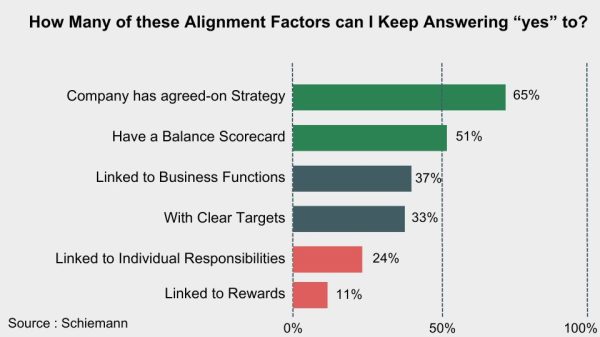Title

Focus your team on the KPIs you measure to drive better team and business performance. Sounds simple, yet most companies and teams have more KPIs or key performance indicators than they need yet don’t use KPIs effectively to change behaviour and drive better performance.
Per Harvard Business School the majority of companies fail to implement the strategy they set successfully. That is a huge number of companies’ most important goals not being achieved. Most employees – 80%+ – don’t really know about or understand the direction or strategy of their company.
From my experience of working in many different companies from world class market leaders to entrepreneurial start ups – I would agree that not really understanding their company’s direction and goals is pretty normal for most employees.
How to Focus Your Team on the KPIs You Measure to Drive Better Performance
- Choosing the right KPIs to achieve goals
- Explain why these KPIs and link the KPIs to team benefits
- Explain how these KPIs will be achieved
- Constantly talk about KPI progress
- Link recognition, rewards, bonuses and promotions into achieving KPIs
If most employees don’t know or understand the goals their team is trying to achieve, how can they work harder on the areas that help achieve those goals?
For how to focus your team on the KPIs you measure to drive better performance in your team and business we are covering:
Too many leaders and managers communicate team goals a few times at team meetings or in presentations and expect employees to know and understand exactly what to do. In reality – for most employees – a lot more is needed to really focus your team on the KPIs you measure and use to increase team performance.
Watch on YouTube
Listen on Podcast
A super important first step is choosing the right KPIs to achieve goals you have been set
Most companies have an excess of data from which they can choose KPIs. Choosing the right KPIs is not an easy task – that focus effort and resources on the most valuable tasks, activities and projects to reach the goals set.
Too many companies only use financial KPIs which are much easier to set, yet very few employees relate these KPIs to what they do on a day to day basis. This lack of connection means less focus and effort is put into the best activities to reach goals.
Start with the goals your team or business needs or wants to reach. Understand how progress towards these goals is being measured so you understand what the finish line looks like. Next, go through all the tasks, activities and projects that your team is responsible for or involved in delivering.
Ask yourself: “If we delivered more, better or faster on this task, activity or project, how would it impact achieving the team goals?” Or another type of question to ask “What are the sales, marketing or operating activities that create the most progress towards goals?” Or you could ask “What tasks, activities and projects create the biggest increases in revenue, profit and cash?”
Prioritise KPIs
Prioritise your options from the most important to the least important.
Another factor to consider is how broad a range of activities does the KPI I am considering capture. For example, the number of sales meeting per week is a much narrower measure than the gross profit generated from new sales per week.
Work out the most suitable and relevant KPI measures to use from the range available. Think operating, sales, marketing and financial KPIs as well as broad KPI measures that capture a lot of different activities and narrow KPI measures that focus on critical points in the process. Try to limit the KPIs you really focus the team on to 5 or less.
Choose KPIs that best capture the most valuable and profit generating tasks, activities and projects that your team can work on.

Second – Explain why these KPIs and link the KPIs to team benefits
Once you have chosen your KPIs, explain to your team – those that will be doing the work that drive these KPIs – why you have chosen these specific KPIs.
Explain the thinking process you went through to choose the KPIs you have. Explain how these KPIs align with reaching the team goals. Doing more of the activities captured by the KPIs should be the best way available to move the team towards reaching the goals set. Explain exactly why this is the case.
A simple example – the team’s goal is to grow revenue by 30% over the year. You choose a KPI tracking the number of sales calls made to potential clients who have attended one of the company’s webinars. You have chosen this KPI because the data proves the number of sales calls to warm leads is the biggest driver of sales growth for the team.
Create Links
Link the KPI into daily tasks, activities and projects that your team does. Explain why increasing the output the key performance indicator measures will help achieve the goal.
Once you have created a clear link between KPI and team activity, I suggest you spell out exactly why this will help the team. Don’t just focus on financial benefits.
For example, from the previous example you might say “Growing revenue means higher profits in the company, higher job security for us all, being part of a success story, more career development opportunities, more cash to reinvest in the business and a lot of appreciation from the other teams.
Make clear why achieving these goals will make the individual team member better off. Don’t assume it is obvious or they understand why. Tell them. Explain it to them until they understand. Answer the “What is in it for me?” question.

Third to focus your team on the KPIs you measure, explain how these KPIs will be achieved
Explain exactly what tasks, activities, and projects each person on the team needs to do and how they will directly or indirectly improve the KPIs that you have chosen. Set personalised targets in terms of the activities and responsibilities that each person on the team has.
Also talk through what resources will be made available to support achieving the goals set. What other departments, projects etc will help in driving the KPIs measures. Then what activities should the team focus on? What should they avoid and how should they prioritise? These are all useful question to discuss and answer.
Also think about training and support to increase skills and capabilities in the team. What can be done to increase the ability of the team to deliver in the most important areas? What are you able to commit to now and what do you need to try to get in place?
Having a realistic plan and carefully though through set of steps adds a huge amount of confidence to the team that they can achieve goals. Use the team to help create the plan of action and you increase their buy-in and commitment to the plan.
Explain how each individual can and will increase the results the KPIs measure.
Fourth, to focus your team on the KPIs you measure, constantly talk about KPI progress
Once you have the KPIs you want to measure, the team understand why you have chosen these KPIs and the team understand how they can improve the results the KPIs measure, keeping the KPIs top priority for each team member is the next challenge.
Way too many managers talk through the KPIs a couple times with the team and expect that is enough. We all work in an increasingly fast paced, and distracting workplace. There is a constant flood of new ideas, initiatives and things the team needs to do – almost on weekly basis. KPIs are soon forgotten about unless you keep reminding the team about their importance.
How To Keep The Team Focused
Here are 7 great ways for how to keep the KPIs you want your team to focus on front of mind:
- Send round a weekly KPI email to team members and stakeholders
- Talk about the KPIs in team meetings and one-on-one meetings
- Regularly meet to go through KPI progress with stakeholders and your manager
- Put the KPIs on a whiteboard in full view of the team or use a TV screen for live progress updates
- Hold huddle meetings each day or week and get team members to update the KPI they own onto a scoreboard
- Hold planning meetings to work how to improve the results the KPIs are tracking
- Create games between team members or sub-teams for biggest increase in KPI progress in that month
There are so many options. The key is to do all of these and keep repeating them. The more time and effort you put into communicating the progress of KPIs, the more you ask questions about the activities that drive the KPIs, the more your team will get the message they are really important to you. If they are important to the manager, they become important to the team members. Actions coveys the KPIs importance a lot more than words ever will.
Keep reminding the team about the KPIs and keep visibility and regularly communicating progress against the KPIs.

Fifth, to focus your team on the KPIs you measure, link recognition, rewards, bonuses and promotions into achieving KPIs
There is a lot a manager can do to incentivise team members to focus on achieving goals and improving KPIs that do not cost money.
For example recognition is a very powerful reward and something everyone wants in some form. Recognition and praise take a bit of time and effort to do well. Ideas include public recognition in team meetings, winning the best team member prize of the month, having their picture on the wall and getting emails celebrating their achievements.
Think about who gets what development opportunities and how you use your time to mentor and coach team members. These are both valuable.
Use your imagination. Ask team members what they would like and how they want to be rewarded. Work out what you can do without any or little budget and permission. You should put these ideas into practice if you haven’t already.
Next, think about all the incentives that require budget, permission and signoff. Link as many of them into improving the KPIs and reaching team goals as sensible. Give bigger bonuses to those that deliver and little or nothing to those that don’t. Give bigger pay rises to those that increase value. Think carefully about who you put forward for promotion and why.
The more incentives you link directly to improving the KPIs you have chosen to focus your team on, the more the team will focus on the tasks, activities and projects that deliver them.
In Summary
Having great and relevant KPIs allows you to understand the performance of teams and businesses easily and quickly. Learning how to focus your team on the KPIs you measure is a step more managers struggle with. More focus, more effort and more time spent on the best tasks, activities, and projects to beat goals will drive better performance in the team and business.
I have used the steps we have gone through again and again with different teams in different companies and they work very effectively. I hope you have just as much success with these approaches.
To recap, the 5 tactics I suggest you use to focus your team on the KPIs you measure are:
- Choosing the right KPIs to achieve goals
- Explain why these KPIs and link the KPIs to team benefits
- Explain how these KPIs will be achieved
- Constantly talk about KPI progress
- Link recognition, rewards, bonuses and promotions into achieving KPIs
If you have any questions, please email me at support@enhance.training and I will get back to you.
[Examples of 30 different Key Performance Indicators can be found here]
Choosing great key performance indicators makes the job of managing performance easier and more objective. Having great KPIs on their own don’t actually improve performance. You get the team to improve performance by using the KPIs to focus their time and energy on the most important areas where they can each individually add value (leading to increased revenue, profit and cash).
Learn how to use KPIs to change team behaviour and performance and you help yourself towards a great management career.
Jess Coles






